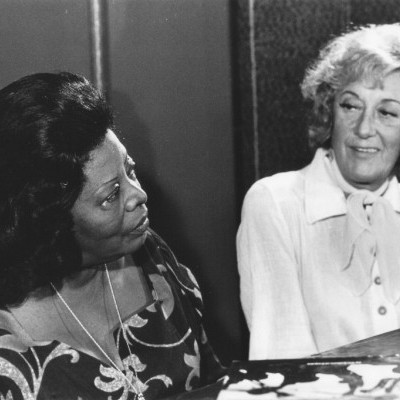
Marian McPartland and Mary Lou Williams in 1978, about 14 years after the two spoke for “Mary Lou Williams: Into The Sun,” which originally was published in DownBeat on Aug. 27, 1964.
(Photo: Courtesy of South Carolina Educational Television)
Her early records are collectors’ items. Her writing and playing have become part of the pattern of jazz history. She has transcended the difficulties experienced by women in the music field and through several decades has held a position of eminence as one of jazz’s most original and creative pianists. She speaks softly: “Anything you are shows up in your music—jazz is whatever you are playing yourself, being yourself, letting your thoughts come through.”
Her voice has the ring of authority, and well it may, for Mary Lou Williams’ career, dating back to her childhood in Pittsburgh, Pennsylvania, and her Kansas City days with the Andy Kirk Orchestra, has always been one of consistent musical integrity.
Mary Lou’s playing is real. Earthy. Running through all the emotions, it speaks volumes, for there is much in its creator that comes out in the music, a part of herself she cannot help revealing, so that at times one has the feeling almost of intruding on her thoughts, of hearing secrets not meant to be shared, of being able to probe the recesses of her mind. Sometimes Mary Lou’s mood is dark, brooding—like a pearl diver, she searches along the depths of the lower register of the piano and then, as if triumphant at a sudden discovery, she shifts to the treble, launching into a series of light, pulsating, chordal figures.
She possesses a natural ability to generate a swinging feeling—an infallible time sense—an original harmonic concept, a way of voicing chords that is only hers. She doesn’t veer far from the blues. Whatever her mood, whatever the tempo, she weaves a pattern, a design, faint at first, like a rubbed drawing, but then appearing more strongly, until it breaks into a kaleidoscope of color.
Mary Lou has found the way to put her emotions, thoughts, and feelings to good use. They come out powerfully, and sometimes prayerfully, for the spiritual side of the blues is always strong in her work. Yet, there is a mysterious air, an enigmatic, slightly feline quality about her, which contrasts strangely with her direct, down-to-earth way of speaking.
One senses the inner fires, the inner tensions, and though she keeps her voice low, at times there is in it a note of bitterness. She has none of the typical trappings of show business. She seems almost indifferent to her appearance, her hair brushed casually, her dress plain and unassuming, her only jewelry a gold cross on a chain. But Mary Lou Williams is not a plain woman; with her high cheek bones, reminiscent of the Mayans, she is beautiful. When she becomes involved in her music, her face will set in mask-like concentration, her eyes closed, giving an impression of stillness, of being lost to the world, even though her foot is tapping and her strong hands are moving swiftly and surely over the keys. Then suddenly she opens her eyes and smiles, and her face lights up and reflects her spirit, her gaiety, and her lively sense of humor.
A religious woman, Miss Williams was introduced to Roman Catholicism several years ago, along with Dizzy Gillespie’s wife, Lorraine (the Gillespies have long been her staunch friends), and it has evidently given her new strength and courage and a fresh purpose. Mary Lou is ready to do battle with the specters of the past. Strong in her faith, strong in her beliefs, a woman with a cause, a crusader, she rails against the injustices of a materialistic world and deplores musicians who talk against each other more than they help each other. Yet, she seems to have had difficulty finding herself, too. In a sense, she is like a child who dreams of a good and perfect world and cannot quite tolerate the fact that it isn’t that way.
At the Hickory House, where she has been ensconced for the last several months, the room casts a haze over her intricately voiced harmonies and, at times, blurs the impact of her changes in dynamics and clouds the clarity of her attack. But there are choice seats around the bar close to the piano, where one can almost shut out the noise of the room and concentrate on Mary Lou and her trio. She sits at the piano with a certain dignity, playing with pride and a sureness of touch. Here is a natural showmanship, complete involvement with the music that speaks for her. But still one must listen closely to get the message.
“Anything you are shows up in your music ... .”